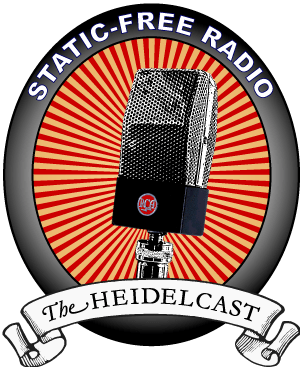Happy New Year from the Heidelblog. Thanks to the two-hundred sixty-three thousand Heidelblog readers in 2019 and to the thousands of you who listened to the Heidelcast. Together (between the Heidelblog and rscottclark.org) you downloaded posts, pages, and podcasts over 758,000 times. . . . Continue reading →
Search results for “federal vision”
The Smear Was Intentional
“[Rachael Denhollander] was in an image, basically blurred, it was an out of focus shot that had some artistic design to it to show that there’s something going on here. I knew you would know who that was, okay? I wasn’t surprised . . . Continue reading →
As It Was In The Days Of Noah (27): 2 Peter 1:3–11 (part 2)
3His divine power has granted to us all things that pertain to life and godliness, through the knowledge of him who called us to his own glory and excellence, 4by which he has granted to us his precious and very great promises, . . . Continue reading →
Heidelcast Minute: What Are The Conditions In The Covenant Of Grace?
Resources Heidelcast 98: Salvation, Good Works, And Conditions Resources On Conditions In The Covenant Of Grace (Updated) Resources On Norman Shepherd Resources On The Federal Vision Theology
A Smear Memorialized
This is the portion of the trailer for the video By What Standard? released by Founders Ministry in which video, known in the business as “B-roll,” of Rachael Denhollander is used to illustrate the words, “always having the powers, the spiritual powers . . . Continue reading →
The Heidelberg Catechism Confesses Salvation By Grace Alone, Through Faith Alone
It has become fashionable among some who identify as confessionally Reformed and among so-called Reformedish (i.e., Baptists who identify with aspects of Reformed theology) types to claim that the Reformed doctrine of salvation hold that there two stages to salvation: initial and . . . Continue reading →
When The Culture War Trumps The Gospel
The German expression, Der Kulturkampf (The Culture War), originally referred to the attempt by Otto von Bismarck (1815–98), the German politician who created the modern, unified Germany, to suppress the Roman Catholic Church in Germany because he feared that Romanism in Germany . . . Continue reading →
A Listener Explains The Benefit Of The Heidelcast Series On Nomism And Antinomianism
Dear Brother I want to thank you. Here, where I live, it is not easy to get Reformed teaching but thanks to technology I have been able to listen to the Heidelcast; specifically to the series on the Marrow of Modern Divinity. . . . Continue reading →
Deconversion And Covenant Theology
In the wake of Josh Harris’ announcement of his apostasy a group of leaders in the so-called Young, Restless, and Reformed movement (YRR) or New Calvinism has written of his “deconversion.” If one searches the history of Christianity one will probably not . . . Continue reading →
Straight Out Of Münster
I think I first read about “web logs” about 1995, when I was teaching at Wheaton College. Then they were the domain of people writing about what they had for breakfast. They were daily, public journals where people recorded online their most . . . Continue reading →
Canons of Dort (32): Our Sovereign God Uses Means To Encourage Us
For perhaps 20 years we have been in the midst of a movement which Collin Hansen (2008) described as Young, Restless, and Reformed. Others have spoken of the “New Calvinists” (see the resources below). The one doctrine that animates these movements is the sovereignty of God. For many American evangelicals it is a given that God has his opinion and we have ours. Continue reading →
Canons Of Dort (19): Unconditional Atonement
\In 1611, Franciscus Gormarus (1563–1641), one of the principals in the controversy surrounding Arminius, resigned his position in the theology faculty in the University of Leiden. He was frustrated that, after Arminius’ death, the governors of the University had appointed Conrad Vorstius . . . Continue reading →
Canons Of Dort (16): Scripture Teaches Both Definite Atonement And The Free Offer Of The Gospel
Rationalism is a word that gets tossed around rather casually at times. It is used without careful definition. E.g., sometimes Lutherans accuse the Reformed of rationalism because we do not accept their Christology or doctrine of the Supper. They accuse us of . . . Continue reading →
Canons Of Dort (12): We Judge God’s Will From Scripture
The doctrine of unconditional election and conditional reprobation has often met with resistance in the church. The early post-apostolic church spoke of the elect and of God’s election and found opposition to it. Augustine rather innocently wrote, “Command what you will, give . . . Continue reading →
The Canons Of Dort (10): Unconditional Grace Gives Assurance
The Remonstrants were convinced that the Protestant doctrine of salvation by grace alone (sola gratia), through faith alone (sola fide) did not and could not produce sufficient sanctification (holiness) and obedience. Thus, without admitting to it, they turned the covenant of grace . . . Continue reading →
Canons Of Dort (8): There Is Only One Kind Of Election
The Remonstrants were dissatisfied with the basic insights of the Reformation and thus of the Reformed faith. They did not agree with the Protestant articulation of the gospel, that Christ came for his elect, to be their obedient, righteous substitute, to die . . . Continue reading →
One Practical Benefit Of Remembering The Synod Of Dort
Eight years ago my colleague at Abounding Grace Radio, Chris Gordon, wrote some important essays calling attention to the parallels between contemporary Federal Vision movement and the Arminian movement at the Synod of Dort. He was quite right to do so. Following . . . Continue reading →
Canons Of Dort (4): Unconditonal Grace
In the preface to the Canons of Dort, Synod characterized the challenges she faced and the promise on which she relied to face those challenges. The preface characterized the Christian life as a “this wretched pilgrimage.” It is one, however, that is conducted under the shepherding care of Jesus, our high priest, who has “entered the heavenly sanctuary to go to his Father,” who is fulfilling the Great Promise behind the Great Commission: “A Lo, I am with you always, even to the end of the age” (Matt 28:20). Continue reading →
With Presbycast On Theonomy
In its narrow, strict sense theonomy is the belief in the “abiding validity” of the judicial laws of the old (Mosaic) covenant “in exhaustive detail.” It is, as W. Robert Godfrey writes, an appealing movement, which is strongly supported by their Postmillennial . . . Continue reading →
The Canons Of Dort (1): Introduction And Background
Few of our Reformed confessional documents are as valuable and yet as neglected as the Canons of Dort. Today most who know about them think of them as the so-called and quite misleading “Five Points of Calvinism” or TULIP: Total Depravity, Unconditional Election, Limited Atonement, Irresistible Grace, and Perseverance of the Saints. Strangely, for many, especially those in the self-described Young, Restless, and Reformed movement, the “Five Points” have become the be all and end all of “Reformed theology.” The truth is that there is much more to Reformed theology than the five points. Continue reading →











